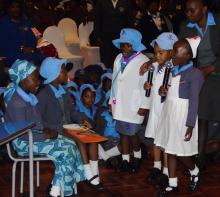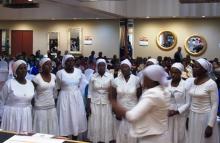Zimbabwe launches new vaccine during the National Immunization Days
Harare, 21 Sept. 2015 : The Honorable Minister of Health and Child Care Dr. David Parirenyatwa, in conjunction with WHO, UNICEF, and other partners, launched the National Immunization Days (NIDs) on 21 September in Harare. NIDs are selected days when measles vaccines as well as vitamin A supplements are given to children between the ages of 6 – 59 months, irrespective of vaccination status, and are extra doses which supplement and do not replace the doses received according to routine immunizations.
The 2015 NIDs are unique in that Zimbabwe will be vaccinating children 9 months to below 15 years with the Measles and Rubella combination (MR) vaccine for the first time. Rubella infection in children is similar to measles but it tends to be a mild infection. The main danger with rubella infection is when mothers acquire them during pregnancy, where it leads to severe birth defects in babies, including mental retardation, heart defects, blindness, and deafness- collectively referred to as Congenital Rubella Syndrome (CRS). Although, measles outbreaks have not occurred in Zimbabwe since 2010, there have been increasing cases of rubella infection as well as CRS reported in Zimbabwe.
The MR catch up campaign will be held throughout the country from 28 September—2 October at all health care facilities, schools, outreach points, and other centers agreed upon by communities like churches, market places etc, and mobile teams will be moving around as well. NIDs are routinely carried out every 3—4 years assuming vaccination coverage has been maintained at 80% and above, to provide an opportunity for children who did not make antibodies when they were vaccinated, and to give a chance to those children who missed their routine vaccinations. This year the campaign targets 5 million children in the age groups of 6—59 months for vitamin A supplementation, and 9 months to below 15 years for MR vaccine. This year’s NIDs aim to eliminate measles, prevent vitamin A deficiency in children, and introduce rubella vaccine for the first time in Zimbabwe.
Speaking at the occasion, WHO Representative, Dr David Okello, said immunization remains the most cost effective way to deal with vaccine preventable diseases . “Here in Zimbabwe we are able to keep a number of conditions under control – including diphtheria, whooping cough, tetanus, meningitis caused by haemophilus influenza type B, hepatitis B, measles, polio, tuberculosis (TB) in children, pneumococcal pneumonia, and rotavirus diarrhoea with vaccines like Pentavalent vaccine; Measles vaccine, Oral Polio Vaccine, BCG (Bacillus Calmette- Guerin) vaccine, Pneumococcal Conjugate Vaccine and with Rotavirus vaccine, and small pox was completely eradicated because of successful international immunization campaigns” said Dr Okello.
He also assured the people of Zimbabwe that the MR vaccine is highly effective and safe as the combined MR formulations have been used all around the world to collectively protect individuals from measles and rubella infections since 1970. He also said he has confidence that the immunization system in Zimbabwe can deliver the needed antigens to infants across the country because the high coverages attained across the different antigens in the past few years successively attest to a robust immunization system.
The UNICEF Representative Mr Reza Hossaini also reiterated that immunization still remains a key intervention in preventing child illnesses and deaths. He spoke about the quality of vaccines used during the campaigns saying UNICEF only acquires vaccines that are pre-qualified by WHO, and which undergo further tests by the Medicines Control Authority of Zimbabwe.
The Minister of Health and Child Care Dr Parirenyatwa said the campaign aims to reach all targeted children by going in to the communities and schools. Dr Parirenyatwa urged all care givers to understand their obligation in ensuring that every targeted child is immunized. The Honorable Minister also acknowledged the support they have received from all partners including technical and logistical support from WHO and from the Measles Partnership which include WHO and UNICEF. He also said the Ministry of Health and Child Care has introduced the new MR vaccine as part of its duty to ensure child illness and deaths due to vaccine preventable diseases cease to be public health challenges in Zimbabwe.
The launch was also attended by the Deputy Minister of Primary and Secondary Education, Professor Paul Mavhima who pledged full cooperation in the national MR catch up campaign. He said for children to be in school, they need to be healthy so he pledged the cooperation of his Ministry to make sure all schools work with the Ministry of Health and Child Care during the campaign.
This year’s launch was attended by women and children from the Apostolic sect to show their support of the immunization programme. Members of the sect are traditionally known for objecting to have their children vaccinated and their participation is a positive sign which will hopefully increase coverage figures and reach previously disadvantaged children who missed their routine vaccinations.
____________________________________________
For more information, please contact:
JULIAS Wendy, Email: juliasw [at] who.int





